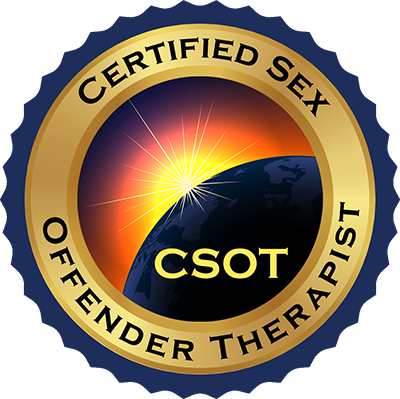Sex Offender Therapy Program FAQ
What is a Sex Offender Therapist?
A Sex Offender Therapist is a licensed mental health professional specially trained to evaluate, treat, and manage individuals who have engaged in, or are at risk of engaging in, sexually inappropriate, abusive, or criminal behavior. This specialization combines clinical, forensic, and behavioral sciences to address both rehabilitation and risk management within a trauma- informed, ethical framework.
Although the term “sex offender” commonly refers to legally convicted individuals, therapists in this field often work with a broader range of clients. These often include those individuals who exhibit sexually problematic or high-risk behaviors but may not have been adjudicated. The work involves close collaboration with families, courts, attorneys, and community systems to promote accountability, healthy sexuality, and public safety.
Clinicians in this field may treat individuals and families affected by:
- Child-on-child sexual behavior or boundary violations
- Adult sexual offenses involving minors
- Incest and intra-familial sexual behavior
- Sexual assault and battery
- Sexual contact with animals
- Possession or creation of child sexual abuse material (CSAM)
- Prostitution or solicitation
- Sexting and online sexual misconduct
- Exhibitionism or voyeuristic behaviors
- Compulsive pornography use and other non-criminal sexual risk behaviors
- Non-offending minor-attracted persons (MAPs) seeking preventive and supportive intervention
Therapists are trained to approach these cases with professionalism, empathy, and clinical precision. They primarily focus on reducing risk, addressing core cognitive and behavioral patterns, and developing strategies for long-term safety and recovery.
How are clients referred to treatment?
Most clients are referred through the criminal justice system, typically via court order or probation. These referrals may originate from probation officers, the state attorney’s office, diversion programs, or child protective services. In Florida, as in many states, over 90% of individuals entering treatment are mandated to do so as part of legal or probationary supervision.
Other referral sources may include:
- Attorneys (both prosecution and defense) seeking psychosexual or risk evaluations
- Dependency or family courts handling custody or protective cases
- Child welfare agencies responding to family-related offenses
- Private clients who have completed supervision but choose to continue treatment voluntarily
Therapists must have a solid understanding of mandatory reporting laws. Any newly disclosed or previously unreported sexual offense involving a minor or vulnerable individual must be reported to the proper authorities. Working in this field requires comfort navigating the intersection of confidentiality, accountability, and community protection.
Should I already be working with sex offenders before taking this program?
No. Prior experience is not required to begin the program. The CSOT curriculum is designed to prepare clinicians for both entry-level and advanced forensic work by introducing the theories, frameworks, and practical skills needed to treat and evaluate sexual offenders and individuals with problematic sexual behaviors.
That said, hands-on supervision during or after completion of the coursework is strongly encouraged. Each state establishes its own qualifications for recognized providers. In Florida, clinicians must complete 1,500 post-degree supervised hours working specifically with sexual offenders. The first 50 hours must occur under the direct supervision of a qualified CSOT supervisor during evaluations, risk assessments, or treatment sessions.
Students are advised to verify the supervision and credentialing requirements in their home state or jurisdiction. The CSOT faculty can provide guidance on supervision documentation, clinical hour tracking, and the transition from supervised to independent practice.
If I live in Florida and do not have my 1,500 hours, am I still able to work with Sex Offenders? How do I become a Certified Sex Offender Therapist?
Yes. Clinicians in Florida may begin working with sexual offenders under qualified supervision while completing their 1,500 post-degree hours. Once the supervision requirement and all CSOT coursework are completed, the clinician is recognized as a Certified Sex Offender Therapist (CSOT) and may independently provide treatment and evaluations.
It’s important to note that some federal and state contracts require full completion of the 1,500 supervised hours before working with adult offenders. The CSOT Program fulfills all educational and training requirements under Florida Statutes, but practitioners must ensure compliance with all applicable regulations before providing unsupervised services.
Additional Information
Therapists completing this program will:
- Meet all Florida statutory educational requirements for certification as a Sex Offender Therapist.
- Gain proficiency in evidence-based approaches to assessment, treatment, and relapse prevention.
- Develop competency in juvenile risk assessment tools (SAI-J, JSOAP-II, ERASOR) and treatment planning models such as the Good Lives Model (GLM).
- Understand ethical and cultural considerations in working with diverse and special populations, including LGBTQ+ clients, individuals with intellectual or developmental disabilities, and non-offending minor-attracted persons (MAPs).
Out-of-state clinicians who complete the CSOT Program receive certification documenting that they have completed a comprehensive, research-based curriculum in sex offender treatment. However, each clinician must still adhere to their state’s specific laws and supervision requirements before representing themselves as an independent sex offender therapist.
Please note:
- Certification through this program does not qualify for NBCC credits.
- Participants are responsible for confirming program acceptance with their state or licensing board.
- Ongoing consultation and supervision are strongly recommended for clinicians new to forensic or high-risk populations, even after certification.










